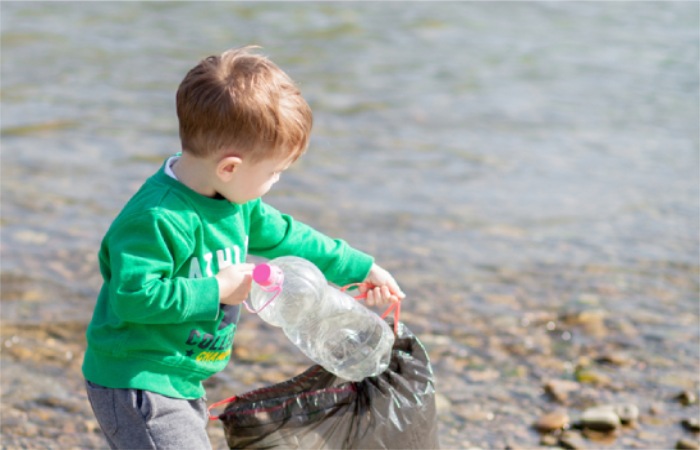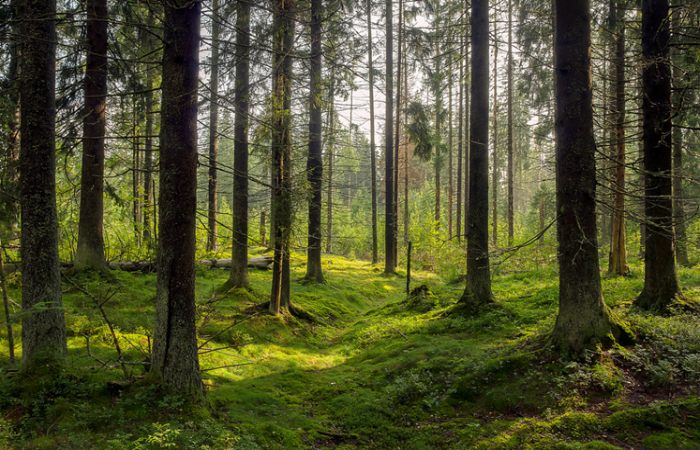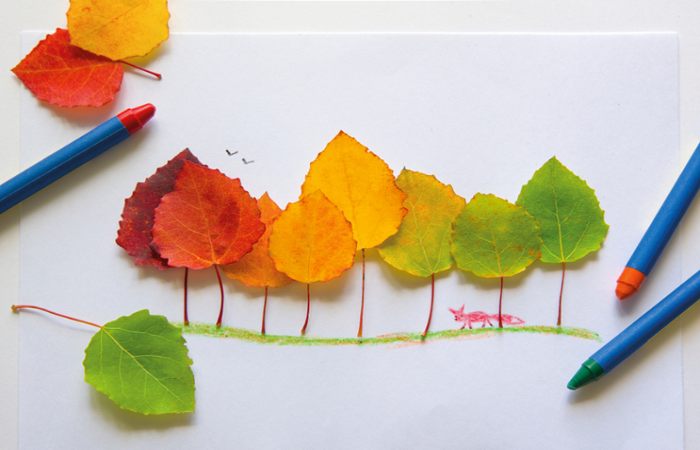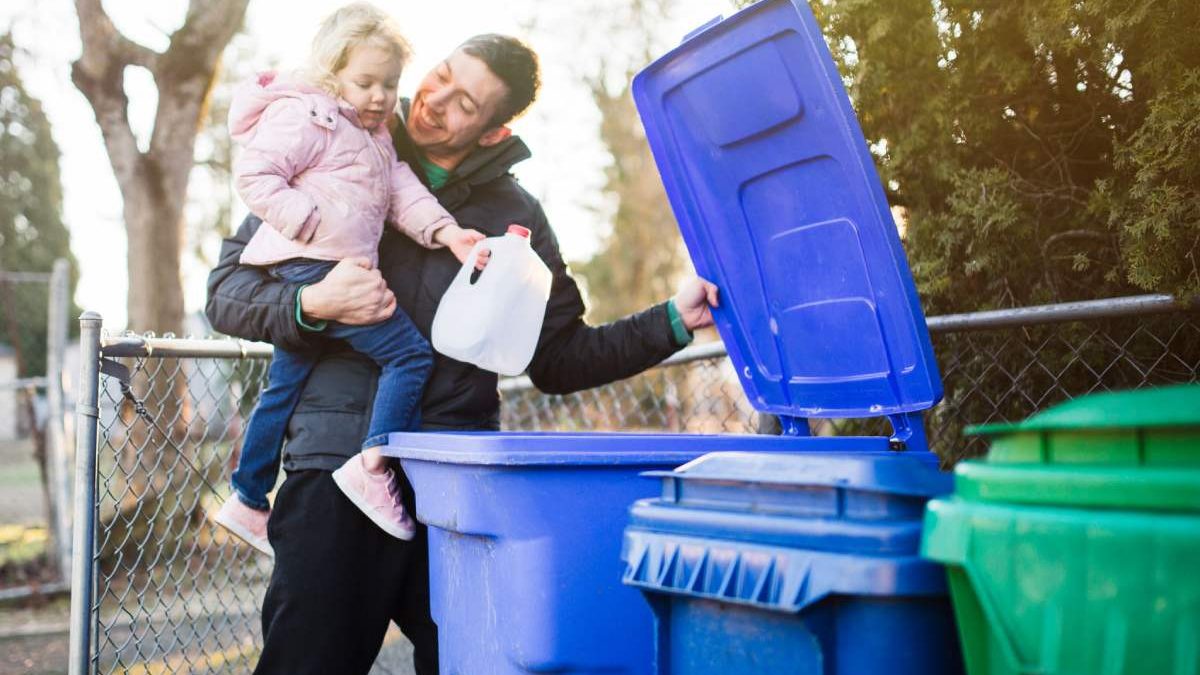Teach Your Kids About Recycling – Parenting comes with important perks. Sure, you have an opportunity to take part in shaping a generation for a better and greener world. But let’s not overlook the best reason to have your own brood of little tykes–you get to play like a kid again.
That’s why when it’s time to teach your kids about recycling, you look for the most fun and creative ideas. Recycling can be tough for tots to grasp. That doesn’t mean parents can’t have a blast as they teach about this important part of being a good — no, green — citizen.
In this article, we break down the three abstract concepts about recycling that can be confusing for kids. Then, we offer up kid-friendly ideas to make those abstract ideas grow into a lifetime of sorting items into recycling bags and other green habits.

Table of Contents
Teach Kids Garbage Doesn’t Disappear When It Leaves the Curb
Teaching about recycling starts by teaching about garbage — what it is, where it goes and why we have too much.
Start with a Snuggle and a Book
Nothing teaches a new concept like reading. And when reading includes snuggles and entertaining books, learning is fun for kids and parents. Get started on your kid’s recycling education with these engaging titles.
- I Can Save the Earth!: One Little Monster Learns to Reduce, Reuse and Recycle by Alison Inches. When Max the Little Monster causes a power outage, he sets out on a fun adventure to learn how to help the environment.
- Trash Revolution: Breaking the Waste Cycle by Erica Fyvie. Packed with pictures by award-winning illustrator Bill Slavin, this book delves into all those pressing questions about trash.
- What a Waste: Trash, Recycling and Protecting Our Planet by Jess French. Filled with facts that illuminate our trash problem, this book helps kids understand why recycling is so important.
Learn About Waste in Your Community
- Take a field trip to your local waste authority. Did you know most municipal waste management authorities offer field trips and programming for kids? Call your local facility to see what they offer. If you’re unable to visit your local landfill or recycling division, take a virtual tour instead.
- Clean up a local park using eco-friendly garbage bags. This project will be more fun if you invite your children’s friends and cap the day with a picnic. Kids will begin to see how unsightly — and common — trash is.
Get Hands-On with Your Own Trash
- Learn about decomposition with this mini-landfill. This easy experiment uses household items to make a self-contained mini-landfill. Kids can bury different trash items and find out which ones decompose.
- Set a goal for reducing how much garbage your household sends to the landfill. Count how many bags of trash your household currently sends to the curb. Then, set a goal and make a plan for reducing those bags. Start by reducing disposable products by using their reusable counterparts. Grocery bags, water bottles and lunch bags are great candidates for greener alternatives. Get your kids involved by asking them for ideas for reducing the number of disposable items your household uses.
- Create a plan to start recycling. Discuss all the tasks that must be done for recycling success, such as rinsing, sorting items into recycling bags and taking the recyclables to the collection point. Then, make the recycling process a family activity.

Teach Kids Everything Comes from Natural Resources
When you buy everything online or in a store, it’s difficult for kids to imagine that everyday objects are made from natural resources. These ideas will help kids understand the ecological cost behind the things we use every day.
Connect Natural Resources to Items Around Your Home
- Use different colored sticky notes to help kids realize the basic materials used in making items. This exercise helps kids understand that items we use every day start out much differently as natural resources. Use blue sticky notes for water, green for trees, yellow for sand and pink for oil. Then, see how many sticky notes you can apply to ordinary items in your home. Don’t forget to reuse and recycle the sticky notes.
Make Your Own Products from Natural Resources
- Give your kids a fun alternative to store-bought items while teaching them how nature provides everything we use.
- Make a bookmark using pressed flowers and leaves. Your kids can make these bookmarks for themselves or, better yet, as gifts for loved ones.
- Make paintbrushes using dandelions or other natural materials. Skip the plastic paintbrushes at the dollar store and make your own with material from nature.
- Make a dominoes game using rocks. You’ll need 28 small rocks to create this fun dominoes game. Once finished, make it the star of family game night.
- Make a wind chime with pressed flower suncatchers. These wind chimes make great gifts or fun decorations for your kids’ bedrooms.

Teach Kids That Recycling Turns Something Old Into Something New
- Using more recycled — and upcycled — items every day will help your kids see the benefits of recycling.
- Bring your kids to the grocery store and ask them to help you pick out eco-friendly products. Look for brands that use recycled packaging or materials in their products.
- Decorate your own reusable grocery bags. Kids will never forget to grab the reusable bags when the totes feature their own artwork.
Save Items from the Trash by Upcycling
Upcycling transforms clean “trash” into useful objects and is a great way to teach kids how something old can become new again.
- Create a cardboard tube bird feeder. Cover an empty paper towel roll with peanut butter. Then, roll it in birdseed. Use a string to hang your new bird feeder outside.
- Melt old crayons into fun, new shapes. Silicone baking trays work great for this project. Collect old crayon nubs and remove their paper wrapping. Drop a few into each compartment of your silicone baking mold. Melt the crayons in the oven at 275 degrees. When they cool, kids will have fun with “new” crayons.
Being Green Is Good Citizenship
Parenting is great fun. It’s the only socially acceptable reason grown-ups can triumph in a game of four-square and then unwind with a tea party among stuffed animals. What’s not to love?
But raising children isn’t all fun and games. Teaching your kids about recycling helps them grow into environmentally conscious adults who will continue to advocate for our planet.
All the same, make sure you dominate in four-square. You want to keep them humble, too.

